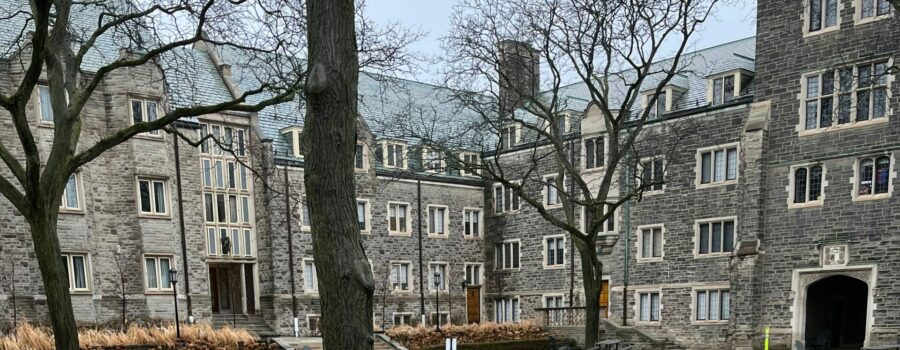Toronto prides itself on being home to several universities, but these universities have gained reputations as commuter schools because student housing near campuses is difficult to acquire. Time spent commuting or working to afford rent takes away from studying or socializing with fellow students. The rights to both education and housing are listed in the International Covenant on Economic, Social and Cultural Rights (1966). However, since housing pressures can deeply impact a student’s university experience, the right to education cannot be fully realized without also implementing the right to housing. This aligns with the Housing First framework, which operates under the assumption that adequate housing is required before other aspects of life can be achieved (Collins & Stout, 2020). The city of Toronto is currently misaligned with this framework, but increased awareness of the student housing crisis and investments in student housing non-profits could aid in alleviating the stress that students experience when seeking housing in Toronto.
Part of this issue is that student housing is an underacknowledged aspect of Toronto’s housing sector. Statistics Canada (2023) includes categories for both housing and education levels in its census but it does not include clear identifiers of student housing needs, which makes it difficult to grasp the extent of the issue. Thankfully, this absence of data is acknowledged in Toronto’s 2022-2026 Housing Plan (2023), which includes the formation of a HousingTO Plan and Academic Institutions Working Group to begin gathering student housing information. This awareness is a step in the right direction but it has yet to emerge in practice: I recently attended one of the city’s Planning and Housing Committee (2023) meetings and despite several agenda items concerning affordable housing, the unique case of student housing was not brought up. Student housing has historically been grouped into affordable housing, but it differs because most students only plan to rent for a few years. Students and long-term residents have different needs and should not be competing for the same resources. The city is beginning to acknowledge this, but further action is required.
The city should take this action because students are an important thread within Toronto’s urban fabric. Toronto’s 2022-2026 Housing Plan (2023) states that “students are not recognized as priority populations in housing policies and programs while they contribute substantially to the economic, social and cultural life of the city”. This lack of recognition is unfortunate since many students are introduced to the city by attending a local university and their experience can determine whether they remain after graduating. If they decide to stay then Toronto benefits, but the current situation makes it difficult to do so. In addition, this situation puts students at risk of homelessness. Mark Aston of Covenant House Toronto estimated that approximately fifteen percent of the shelter’s residents are post-secondary students (Periera, 2022). This directly compromises the students’ abilities to complete their educations and limits the aforementioned valuable contributions that they can make to the city.
To address this issue, the province of Ontario should implement a fund for student housing non-profits to buy property near universities. These properties could then be adapted to suit students’ needs and could remain affordable in perpetuity. This would ease the burden on students to afford adequate living conditions and keep them out of the profit-oriented private market, allowing them to realize their rights to both education and housing. There is currently no such fund in place on a provincial level. On a municipal level, the city has a few initiatives to maintain affordable housing, such as the Open Door program (City of Toronto, 2023), but they do not include non-profits. There is evidence that doing so would make these initiatives more successful, as several of Toronto’s housing non-profits are familiar with the issue on a deeper level and have the skills to show for it—they just need the financial support. There are even some non-profits in Toronto that already purchase and maintain affordable housing units, such as Circle Community Land Trust (2021), which has recently been put in charge of over five hundred affordable housing units throughout the city. Connecting these skills with government funding could massively impact the student housing crisis.
Similar actions have been successfully taken by other provinces. British Columbia’s provincial government recently dedicated a fund of $500 million for local non-profits to obtain affordable housing (CIBC, 2023). This fund is being used to keep currently affordable housing out of developers’ hands and ensure long-term security for tenants. In Quebec, a student housing non-profit called UTILE opened its first affordable student residence in 2020 where students pay ten to thirty percent below market rates (Bula, 2022). UTILE is working towards several other residences with the help of both private and public partnerships and eventually aims to house ten percent of Quebec’s student renter population (UTILE, 2021).
Since the fund would be generated at a provincial level, the city should petition the provincial government to allocate this funding to student housing non-profits in Toronto. A potential barrier to the use of this funding is that there are few Toronto-based student housing non-profits. The city could reach out to student housing non-profits in other provinces, such as UTILE, and provide resources for them to expand their efforts into Toronto. The city could also allocate these resources to current affordable housing non-profits, such as Circle Community Land Trust, if they open branches that focus on student housing.
Even though provincial funding is out of the city’s control, the municipal government is entirely capable of raising awareness of the student housing crisis. When Collins and Stout (2020) studied the province of Alberta, they found that its housing policies did not include enough language that emphasized the right to housing. This proves that acknowledgement in literature is important for people’s understanding of a given issue, therefore Toronto should specifically account for student housing in its policies going forward. Provincial funding for affordable student housing units is a long-term goal that would be incredibly beneficial and should be fought for but more immediately, the city can increase dialogue and data collection regarding student housing. For students who are moving to the city for the first time, like I was two years ago, clear communication of resources from both the city and the universities could help immensely. Recognition of the student housing crisis in Toronto and investment into its affordability would help realize students’ rights to housing and education and create better homes for the future.





